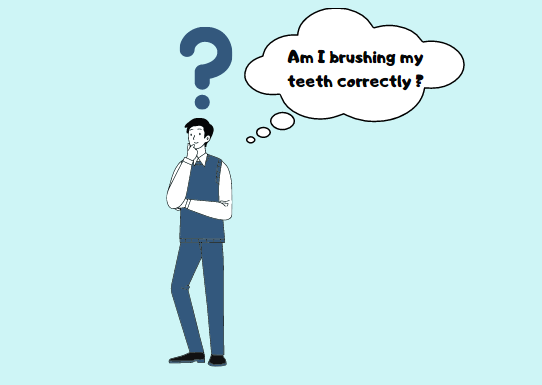7 Signs You're Not Brushing Your Teeth Properly
 Tooth brushing is considered a prerequisite for maintaining not only good oral health but also general health.
Tooth brushing is considered a prerequisite for maintaining not only good oral health but also general health.It helps to remove the dental plaque, which is considered the main factor of cavities and gum disease.
Plaque is a soft, bacteria-rich deposit that sticks to teeth and gums. If not removed, the bacteria will invade our tissues and can reach the bloodstream to affect other vital organs including the heart! So brushing your teeth can save your life.
Discover in this article 6 signs that you are not brushing your teeth properly.
1. You have bad breath
Bad breath or halitosis can be a sign of many oral and general health problems. Poor hygiene is one of them.Indeed, when we eat, the food gets stuck in our mouths. Some bacteria will decompose it and release volatile products responsible for this bad smell.
If you don't brush your teeth enough, bacteria that cause halitosis will multiply and you will end up with bad breath.
Home remedies for bad breath: For a short-term solution, you can find mouthwashes and chewing gums on the market that will allow you to temporarily get rid of bad breath.
For a long-term solution, brush your teeth thoroughly at least twice a day, floss daily, and don't forget to clean your tongue which is a breeding ground for bacteria. if your bad breath persists, don't hesitate to see a health professional. It could be another condition that requires medical treatment.
2. Your teeth surfaces are rough
After brushing, the surface of the teeth should be smooth, if this is not the case, it means that the plaque has not been properly removed.You can tell by running your tongue over your teeth or by gently scraping your teeth with a toothpick. If you notice a whitish deposit on the tip, it means that there is still plaque.
When you brush your teeth insufficiently, plaque will build up and become tartar, which is impossible to remove at home and need a professional dental cleaning.
3. Dental wear
Studies have shown that tooth wear can be influenced by several factors, including not only the properties of the toothpaste and toothbrush used but also the frequency and strength of brushing.Intensive brushing can lead to enamel wear (the outermost tissue of the tooth) and dentin exposure (the tissue under the enamel), which is more sensitive to bacteria.
Make sure you brush your teeth gently with a soft or medium bristle toothbrush and don't forget to change it every three months.
Also, Don't brush your teeth immediately after an acidic or high-sugar meal, as this can cause further enamel wear. Instead, wait about 30 minutes until the demineralizing effect of the meal has worn off.
One study showed that tooth wear is higher when brushing immediately after acid exposure compared to brushing before exposure.
Proper toothbrushing exceeds possible side effects by far, but over-brushing - especially of eroded teeth - might cause some harmful effects.
4. Your teeth are discolored
Tooth discoloration can be caused by certain medical conditions, foods, smoking, trauma, and poor oral hygiene.The quality of your toothbrushing can influence the color of your teeth. If certain pigmented substances are not removed from our teeth, they will cause staining and even enamel damage.
As long as it is limited to the surface of the tooth, brushing and flossing may be enough to reverse it. But, if the discoloration is deep, professional teeth whitening at your dentist is necessary.
The best way to prevent or get rid of tooth discoloration is through good hygiene and regular visits to your dentist.
5. You have teeth sensitivity
Sensitivity means that the outer tissues of the tooth are damaged and therefore do not sufficiently protect the pulp where the nerves and blood vessels are located. It is a sign that your oral hygiene is not sufficient.Make an appointment with your dentist for a check-up without delay: the sooner you treat the lesion, the better.
6. You have gingivitis
Do you bleed when you brush your teeth? This is a classic sign of gingivitis, an inflammation of the gum tissue caused by plaque buildup around the teeth.If you notice bleeding, swelling, or redness of your gums, don't worry, gingivitis is reversible as long as you take the right actions.
The best way is to talk to your dental hygienist, who will clean your teeth to remove plaque and tartar and give you some great tips on how to maintain good oral hygiene. At home, brush more regularly, floss, and consider antibacterial mouthwashes.
7. You have receding gums
The two most common causes of receding gums are intense tooth brushing and chronic gum inflammation.People who brush their teeth with hard-bristled toothbrushes can end up losing their gums, exposing the roots. This can lead to hypersensitivity.
Chronic gingivitis, on the other hand, results from the breakdown of the bone that supports the teeth. As the bone disappears, the gums that cover it recede.
If you brush your teeth aggressively, start by using a soft-bristled toothbrush and be gentle with your teeth.
If you have chronic gum disease (persistent inflammation), make an appointment with your dentist to get a deep cleaning to eliminate the most common cause of gum disease.